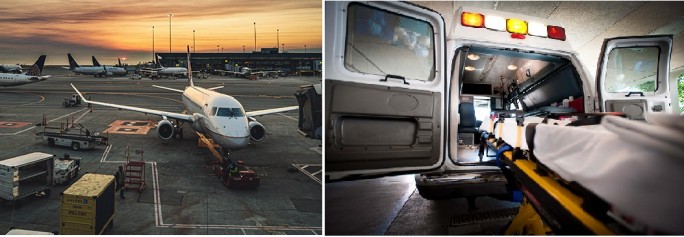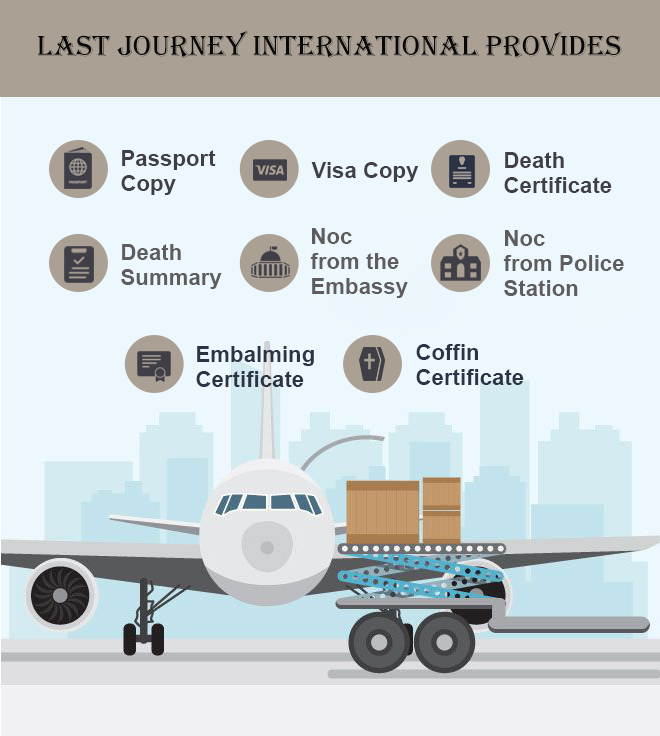Repatriation Blog
How to Transport a Dead Body From the UK to India?

 Table of Contents
Table of Contents Reading Time: 4 minutes
When someone close to you dies abroad, bringing them home for a funeral can add more to the already stressful situation. What do you do first? What are your responsibilities? Who do you need to contact? You could be perplexed by a variety of other reasons as well. Repatriation is the process of transporting a deceased person’s body from one country to another.
Repatriation Services from UK to India
- Passport of the deceased.
- Local death certificate.
- Embalming certificate.
- Freedom from infection certificate.
- Permission to bring the person out of the country.
- Permit for the country of destination if required.

Different countries have different guidelines for body repatriation, therefore the methods below may alter significantly depending on where you are. For repatriation, it’s best to check with your chosen provider.
If your loved one has died in the UK, and you want to transport their dead body to India for funeral you will need to organize repatriation of mortal remains.
To understand the complete procedure visit Corpse Repatriation from the UK to India, which may differ significantly depending on the circumstances, follow the instructions exactly.
The Indian embassy, or the local authorities may be able to assist you if you have questions regarding the process and what to do. Alternatively, you can call Last Journey Funeral Services, which is one of the most trustable repatriation services and funeral undertakers in India. They will be able to assist you better with the procedure.
#1 Contact the Local Authorities
The first step in repatriating a body from another country is to contact the local authorities in the UK so that the death can be registered. The Indian embassy should be able to assist you with the process of registering a death outside of India. You may be able to register the death with the Indian authorities at the same time in some situations.
#2 Notify the Coroner that you wish to Repatriate the Body to India.
This is done via a ‘Form of notice to a Coroner of intention to transport a body out of England or Wales,’ or a ‘Furth of Scotland letter,’ which is issued by the Procurator Fiscal in Scotland. The coroner’s notice must be received within four clear days of the coroner’s receipt of the notice.
The body may be removed at any time after the acknowledgement has been received by the person to whom it is addressed if the coroner declares that they are satisfied and that no further inquiries into the death are required.
If the coroner approves, the family may be able to continue sooner if there is an emergency and they do not want to wait the whole four days. A copy of the registrar’s ‘Certified Copy of an Entry of Death’ must be attached to the form of notice to a coroner.
Form 103, ‘Form of acknowledgement by the coroner,’ is used by the coroner to confirm receipt of their formal notice.
#3 A ‘Out of England’ certificate will be issued by the coroner.
The local coroner should be contacted for a ‘Out of England’ certificate once the decision to return the body has been made. If the individual died in Scotland but you want to bury them somewhere else, you’ll need the following documents:
Certificate of No Liability to Register: The registrar at the site of burial in England or Wales can provide you with it.
Death Certificate, or letter from the Procurator Fiscal (coroner) in Scotland: Provide the registrar either a death certificate or a letter from the Procurator Fiscal (coroner) in Scotland, and sign a declaration form in England or Wales.
Since each country has its own set of rules, it will depend on where you want to bury the deceased. Before the body may be repatriated from Scotland, certain countries demand an investigation. If this is the case, the Procurator Fiscal will be contacted and a Furth of Scotland letter will be sent to the person in charge of the body’s transportation.
You must use the same procedure as you would in England or Wales to arrange repatriation from Northern Ireland.
#4. Determine whether a post-mortem examination is required.
This is a necessary need for travel to some countries. The coroner may decide to hold an inquest to determine how the person died based on the results of the post-mortem.
#5. Arrange all of the necessary documentation.
You should call the consulate of the nation where the deceased will be repatriated to make sure you have everything you need. You may require the following documents:
- Form 103, a ‘Certified Copy of an Entry’ from the Registrar, acknowledgement from the coroner
- A doctor’s certification that “as far as the sanitary standards are concerned, there is nothing to prohibit the body from being exported” and a ‘Freedom from Infection Certificate’ showing the cause of death.
- Embalming certificate (although not usually required, most countries would insist on it as standard procedure)
- Passport of the deceased
- NOC from the Indian Embassy
A trustworthy Funeral Services like Last Journey will be able to assist you with all the necessary certificates for transporting a dead body to India.
#6 Get the body ready for repatriation.
The body must be readied for transit before repatriation can take place. This will include the following:
- Embalming the dead – this slows down the deterioration of the deceased’s body and gives them a more serene appearance.
- Provision of a zinc-lined coffin — this is frequently necessary when transferring a body across international borders.
- Correct coffin size – the coffin or casket size must be examined to ensure that it is suitable, especially if a smaller aircraft will be used for onward transmission later in the journey.
- Coffin packaging — this varies depending on the country to which the body is being transported, but may involve standards like hessian wrapping or bubble-wrapping the coffin.
Your email address will not be published. Required fields are marked *










